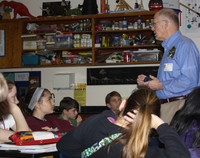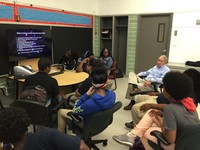

Nease High School students will soon participate in experiments that have been conducted on the International Space Station (ISS), allowing them the opportunity to provide real feedback to scientists.
Nease science teacher Christina Talbot is partnering with Orion’s Quest, a nonprofit organization that engages middle and high school students in ISS research, to carry out the project in her earth and space and physical science classes. Through observation and analysis of research videos and photographs from orbit and into the classroom, Talbot’s students will provide real data that is passed on to scientists in support of research databanks.
The current live mission, STEM on Station, studies the effects of microgravity on the human heart. The findings of this research could also advance the understanding and treatment of heart disease here on Earth. Current virtual missions include studies of the effects of space on microbes, plant growth, spiders, fruit flies, butterflies, and worms.
“Having a staff member who is also a practicing teacher brings important insights to our curriculum development process,” said Peter Lawrie, executive director for Orion’s Quest. “This work supports world class scientists and we are thrilled that forward looking teachers have seized on this opportunity to expose their students to the wonders of STEM education at this level.”
Talbot hopes to kick off Nease’s weeklong project this week. Talbot explained that her students will conduct experiments on crystal structure to study the effects of gravity. Students will look at photographs of crystal structure experiments that have been conducted on the ISS without gravity, she said, and then run similar experiments in the classroom with gravity in play to analyze the difference.
“They get to see real life applications,” Talbot said.
After the experiment, students will take part in a conference call with Orion’s Quest to discuss the data and provide feedback on what they learned.
Orion’s Quest is the only organization in the United States that offers a program of this kind. The nonprofit provides materials and support needed for the experience free of charge. Teachers can choose to engage their students in “live missions” currently being conducted on the ISS, or “virtual missions” that support past ISS experiments for which scientists continue to collect data.